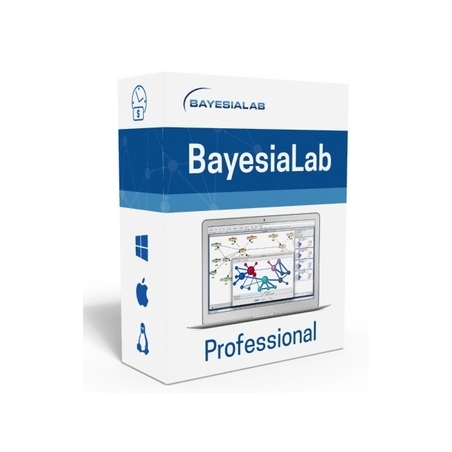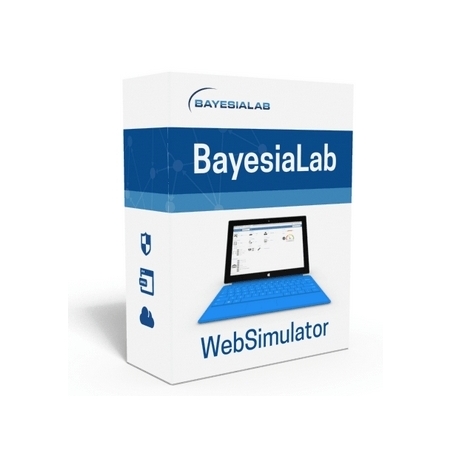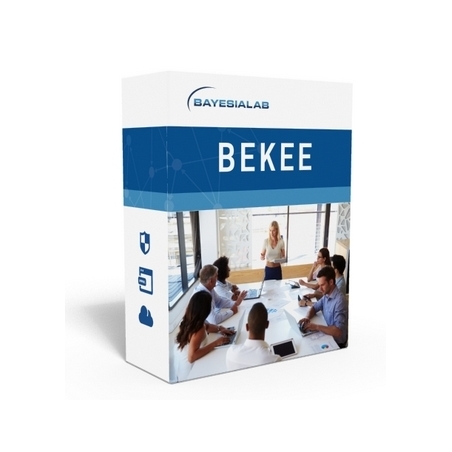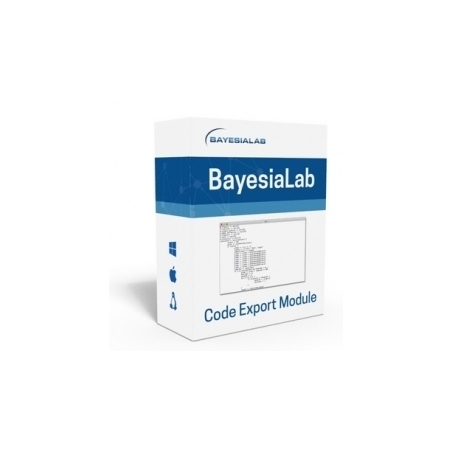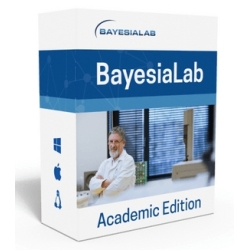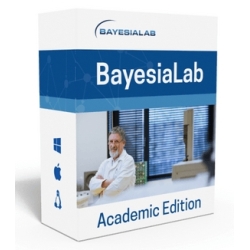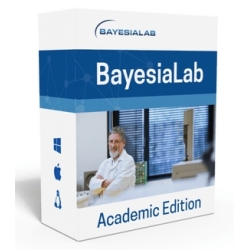Products
BayesiaLab is suite of powerful Artificial Intelligence programs that provide researchers a comprehensive “lab” environment for machine learning, knowledge modeling, analytics, simulation, and optimization — all based on the Bayesian network paradigm.
Subcategories
-
BayesiaLab
BayesiaLab is a powerful desktop application (Windows/Mac/Unix) for knowledge management, data mining, analytics, predictive modeling and simulation — all based on the paradigm of Bayesian networks. Bayesian networks have become a very powerful tool for deep understanding of very complex, high-dimensional problem domains, ranging from bioinformatics to marketing science.
BayesiaLab is the world’s only comprehensive software package for generating, manipulating and analyzing Bayesian networks. Analysts and researchers around the world, including Bayesia’s strategic partner P&G, have embraced BayesiaLab to gain unprecedented insights into problems which had previously not been tractable with traditional analysis methods.
BayesiaLab is the result of nearly twenty years of development by a team of researchers, led by Dr. Lionel Jouffe and Dr. Paul Munteanu, who are widely recognized as world leaders in their field of study. While cutting-edge research tools are often of no practical use outside the laboratory, BayesiaLab is a major exception. Its performance is like a Formula One race car; its everyday practicality resembles an SUV. As such, BayesiaLab provides an extremely user-friendly interface that allows novices and experts alike to easily and quickly navigate all the functions available in the program. Intuitive menu structures and step-by-step wizards allow end-users to focus on their principal analysis task without having to worry about idiosyncratic syntax or arcane commands.
-
Hellixia
Hellixia is BayesiaLab’s Subject Matter Assistant and GenAI Partner, designed to enhance Bayesian network modeling with AI-driven capabilities. It enables:
- LLM Knowledge Mining – Extract insights from the Deep Neural Networks of LLMs and textual data.
- LLM-Augmented Machine Learning – Enhance BayesiaLab’s machine learning algorithms with causal insights and cluster analysis.
- LLM-Powered Brainstorming Assistants – Facilitate qualitative (variables) and quantitative (probabilities) elicitations.
- LLM-Enhanced Network Documentation Tools – Automate verbalization of relationships, comment generation, image creation, and translation.
By bridging GenAI with Bayesian networks, Hellixia empowers users to streamline workflows, extract deeper insights, and optimize decision-making.
-
Bayesia Engine
The Bayesia Engine is an API that allows developers to integrate Bayesia’s technology in external applications and deploy models generated with BayesiaLab for automated inference, e.g. in real-time applications.
You can access many of BayesiaLab’s functions outside the graphical user interface by using Bayesia’s Modeling and Inference Engines. You can thus leverage Bayesian networks in your own applications and deploy them for external access, e.g. by clients, without requiring them to install their own copy of BayesiaLab.
The Bayesia Engine API is implemented as a pure Java class library (jar file), which can be easily integrated into any software project.
With the Modeling Engine in the Bayesia Engine API you can create your own Bayesian networks from within your code and subsequently perform inference with the Inference Engine.
The Inference Engine in the Bayesia Engine API allows you to perform inference on Bayesian networks from within your own application. Networks created with BayesiaLab, or with the Modeling Engine, can both be used for computing inference with the Inference Engine.
A typical implementation scenario would be developing a Bayesian network offline with BayesiaLab and then deploying this network for real-time prediction on streaming data with the Inference Engine.
For more details, please see the Bayesia Engine API Documentation.
-
BayesiaLab WebSimulator
The BayesiaLab WebSimulator is a web-based application, hosted on Bayesia's servers in France, which allows you to share interactive models with your audience without having to install BayesiaLab on their computer.
The BayesiaLab Simulator uses your .xbl file to create a web page that is specific to your network. You can designate which nodes are accessible as Input Nodes and Output Nodes. Once the network is published, the BayesiaLab Simulator utilizes the Bayesia Engine API to perform inference in your network. This allows anyone to enter observations/evidence for the nodes in your network via the web. The BayesiaLab Simulator's web interface is responsive, thus allowing even tablet or smartphone users to work dynamically with your published network. Whenever evidence is set, the user will immediately see updated probability distributions of the Output Nodes.
There are two kinds of simulators: the public simulators that are accessible to anybody, and the private simulators for which the access is restricted to the users that have the identifier of the model and its password.
Five public simulators are automatically included with your BayesiaLab license.
The private ones are available via different packages (5, 10, 20, 50 and 100 models/instances).
A model can only have one instance on the server, i.e. one concurrent access to the Bayesia Engine for inference. In order to add concurrent accesses, you need to add models.
-
Hellixia Course
Our brand-new three-day course program was developed to help you leverage the immense opportunities of Generative AI in the context of Bayesian networks using Hellixia.
Hellixia is BayesiaLab’s GenAI assistant and offers a suite of functions to assist in characterizing and analyzing problem domains, including:
- Dimension Elicitation: Identifies key dimensions of a problem domain by querying Large Language Models (LLMs) and proposing relevant dimensions.
- Generate Semantic Networks: Creates semantic networks by extracting main dimensions related to a user’s query, generating embeddings, and applying machine learning to reflect semantic proximities between dimensions.
- Generate Causal Networks: Develops causal Bayesian networks by tapping into knowledge available in LLMs, generating nodes, explanatory comments for causal links, and constructing conditional probability tables.
- Document Analysis: Provides tools for structured semantic analysis of knowledge files (e.g., txt, pdf, mp3), including generating causal networks, semantic flowcharts, and causal semantic diagrams.
- Generate Comments and Descriptions: Enhances node content by generating detailed descriptions and comments, aiding in the understanding of classes of nodes and their relationships.
- Generate Translations and Images: Translates names and comments of nodes into different languages and generates images to be associated with nodes, enriching the visualization and accessibility of the network.
These features make Hellixia a powerful tool for researchers and analysts working with Bayesian networks, facilitating deeper insights and more efficient modeling processes.
Participants who do not have access to a BayesiaLab license will be provided with a BayesiaLab Token for the Professional Edition valid for 2 months. Additionally, all trainees will receive a 2-month AI Power Pack, providing API keys necessary for Hellixia to access Large Language Models (including OpenAI, Anthropic, Google, Mistral, and Deepseek).
-
BayesiaLab Courses
Since 2009, we have been teaching Introductory and Advanced BayesiaLab courses worldwide. Our regular teaching schedule includes cities such as New York, Paris, London, Dubai, Singapore, and Sydney.
Beginning in 2019, we started offering livestream options as well, enabling real-time participation from anywhere in the world.
Additionally, we provide on-demand self-study courses, allowing you to begin a comprehensive BayesiaLab curriculum at your convenience.
-
BEKEE
BayesiaLab Expert Knowledge Elicitation Environment, or BEKEE for short, is a web application that is designed to minimize detrimental group biases in brainstorming sessions for knowledge elicitation from domain experts. The central idea is not to coerce consensus, but rather to elicit everyone’s individual views regarding the domain under study. To ensure the independent elicitation of probabilities, BEKEE queries experts individually via web-based interactive or batch questionnaires, which is are linked to the BayesiaLab application of the session facilitator.
-
BCEM
BayesiaLab Code Export Module, or BCEM for short, translates predictive network models into program code that can be pasted into other programs.
BayesiaLab Professional is required to use this module.

